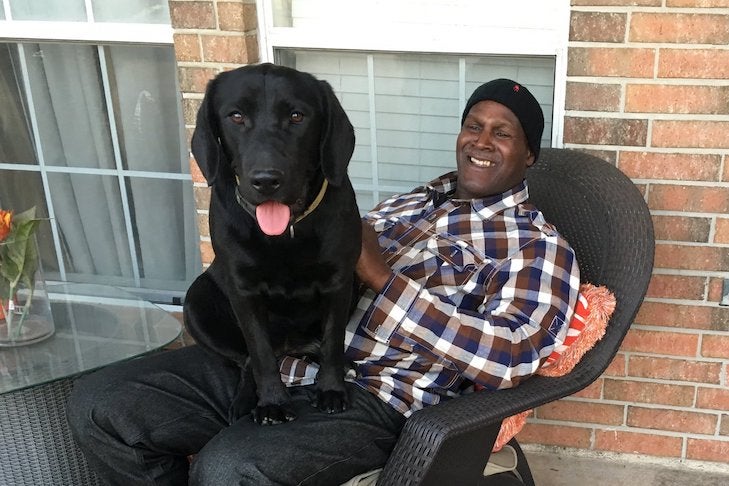
Malcolm Alexander spent nearly 38 years locked up in the Louisiana State Penitentiary at Angola for a crime he did not commit.
In January 2018, he was exonerated and given his freedom.
As he left the courthouse, one of the first questions he asked was, “What about my dog?”
The dog was a puppy he raised behind bars. She was born on April 22, 2017, as Alexander was in the last phase of a decades-long fight to prove that he never belonged in prison.
This puppy was not part of Angola’s formal dog-related programs, including one in which prisoners train service dogs for veterans. Angola, the country’s largest maximum-security prison, is a working farm with a lot of animals. It’s often made headlines for its annual rodeo and for a short-lived experiment using wolf hybrids as guard dogs.
A few prisoners are allowed to have pets, and in 2017, one of these had pups.
“My friend asked me if I wanted a dog. I said, ‘Hey, man, I’d love to have a dog,’” recalls Alexander. “A pet to come home with because I knew at that point I was getting out.”
When the pups were about a week old, Alexander had a chance to pick the one he wanted. He asked for the last one born, the runt of the litter, the one who needed the most love.
Alexander’s supervisor said he could keep the sleek black puppy with the white foot at his workplace, the prison metal shop and woodshop.
“We call her Inn,” Alexander told the AKC in a phone interview, “but her name is Innocent. I was innocent, and she was innocent.”
When the puppy came into his life, Alexander had just filed the latest in a string of bids for his freedom.
“I used to tell her, ‘Look, we’re going to be free. We won’t be here our whole lives. We have to be patient.’ ”
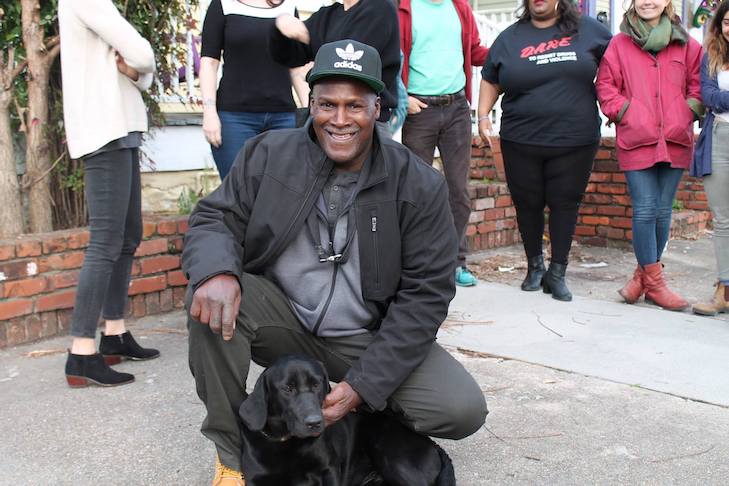
The Crime
On November 8, 1979, a 39-year-old woman was working in her antiques shop in Gretna, Louisiana. A stranger entered her store, dragged her into the bathroom, held a gun to her head, and assaulted her. He was behind her during the attack; she did not get a good look at his face.
The victim described her attacker as a Black man in his early 20s, about 6 feet tall and 165 to 170 pounds.
A few months later, police questioned Alexander on a different charge that would later be dismissed. A detective thought something about him fit the victim’s description in the November attack.
In March 1980, the woman viewed a photo lineup that included a picture of Alexander.
She “tentatively” identified him as the attacker.
In a live lineup later, she made a “possible” identification.
A few hours after that, she reported she was 98 percent sure it was him.
Alexander’s trial took one day from jury selection to the verdict—guilty. His attorney, who called no defense witnesses and only briefly cross-examined the victim, was later disbarred for providing incompetent defense for dozens of clients.
Alexander was convicted on a single piece of evidence—the victim’s identification. It’s estimated that such testimony plays a role in about 70 percent of wrongful convictions.
He was 21, the father of a 2-year-old son, and he was headed to prison for life without parole.
“I knew I was innocent. I didn’t do it,” he says. “I knew the truth was going to be known.”
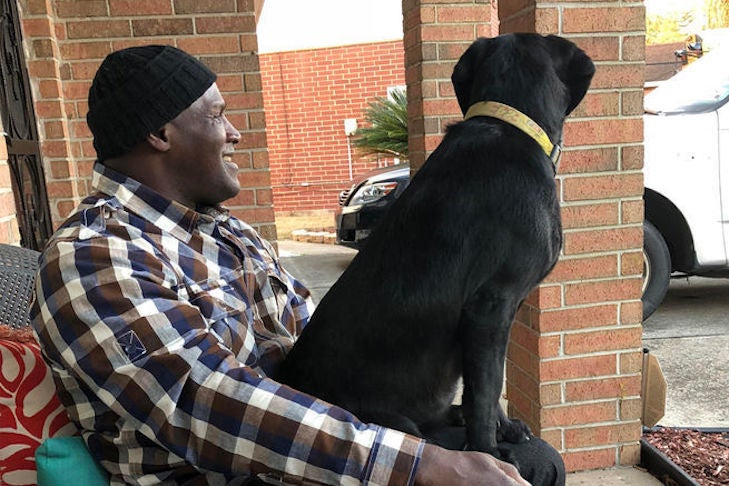
Dogged Determination
In 1986, a glimmer of hope came from England when “genetic fingerprinting” was used for the first time to catch a killer. Six years later, New York City attorneys Barry Scheck and Peter Neufeld launched the Innocence Project, aimed at harnessing this powerful new technology to help the wrongly convicted.
As of January 2021, according to the Innocence Project, more than 375 such cases in the United States have been overturned by DNA evidence.
Around 1996, Alexander contacted the organization. Unfortunately, key evidence containing the assailant’s DNA had been lost. But in 2013, additional items turned up—three hairs that police had recovered at the crime scene.
The Innocence Project New Orleans became involved in the case and pushed for genetic testing of the hairs.
The results proved that Alexander did not commit the crime.
On January 30, 2018, Alexander stood before a judge who vacated the conviction and set him free.
Waiting outside were his mother, sister, son (now grown), grandson, and other family members. Also, there was Brenda, his middle-school sweetheart and the mother of his child. They married within months of his release.
But Alexander was not about to forget a promise.
“I didn’t know that they were going to release me directly from the courtroom,” he says. “One of the things I asked was, ‘What about my dog?’ ”
Inn had been his support through the tense months waiting for the genetic tests and the decision. “To be honest with you, I never really knew whether or not I was going to be able to prove my innocence,” he says. This might have been his last chance at freedom.
“She cleared my mind from thinking about the institution. Inn became my family.”
Perhaps, most importantly, the brown-eyed pup helped prepare him for life outside.
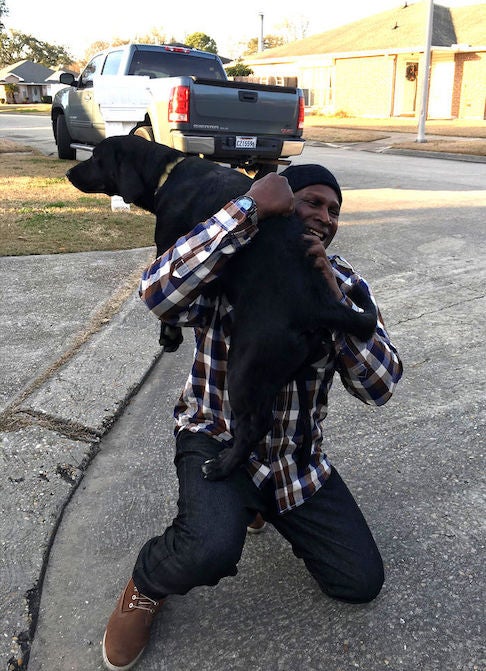
To survive in prison, Alexander had to become wary and hardened to feelings. “In the institution, you meet some weird people, and they’re not all nice,” he says. “They say a dog is man’s best friend. Inn was able to instill loving care back in me, that compassion. … It was very comforting. Inn became my best friend during my last year there.”
They formed a tight bond during the eight-hour workday when they were together all the time.
On Alexander’s breaks, they would play and do some training. He had grown up with large dogs, mostly German Shepherds, and had been around other dogs at Angola. He knew about training and what he wanted to teach her.
Inn’s commands were straightforward, like: Stand here, come when I call you, don’t eat that, lay down.
“I never wanted to make her roll over or do tricks. I wanted her to free her mind,” Alexander says. “Being in the institution, everything you do is basically controlled. I didn’t want that for her. I wanted her with a range of freedom, as much as I could allow her to have.”
A Princess
A day after Alexander was freed, staff from the Innocence Project fetched Inn from Angola. It had only been one day, but Inn leaped into Alexander’s arms as if they had been separated for years.
“Him being with her is all good. I liked that he had a pet with him in prison,” says Brenda, also a dog lover. “And when he got her, she jumped all over him. I said, ‘Well, she comes before me.’ ”
Both had a lot to learn about life outside. Alexander had to figure out how to navigate in a world that revolved around computers, cell phones, and the internet—technologies that did not exist at the time of his incarceration.
Similarly, Inn needed some essential lessons. In prison, she was in a kennel or a workroom when Alexander was not around. He couldn’t be with her through the night because she was not allowed in the dormitory. That made it impossible to housetrain her properly. There were a few accidents.
Luckily, she quickly learned the appropriate etiquette for her new home. “Now when she wants to go out, she barks,” he says.
Soon, they were both getting used to their new situation. Alexander got a job as a pump operator for a local drainage department and became an emergency responder in case of floods or other disasters. Inn has learned to be at ease on busy streets with lots of noise and people.
They revel in the city’s lively festivals, especially the Mystic Krewe of Barkus—also known as the Mardi Gras Dog Parade—held in the French Quarter since 1993.
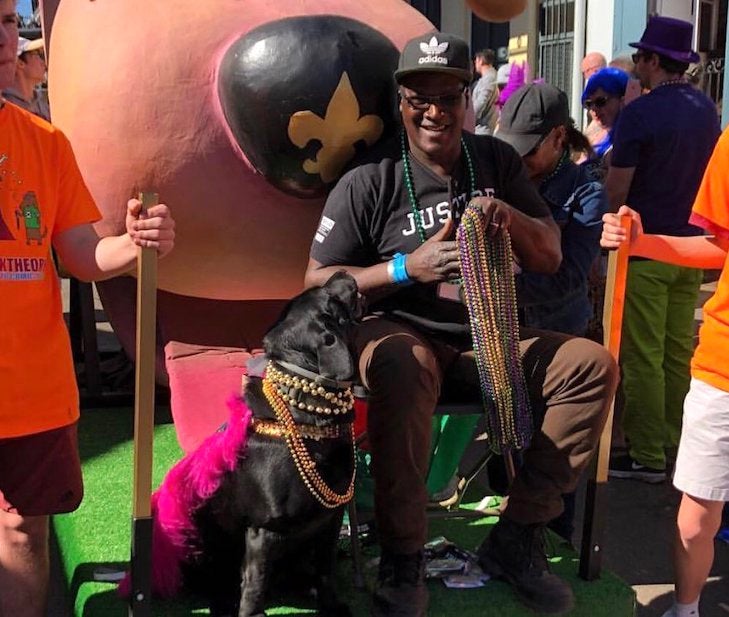
In 2019 and 2020, Inn was honored as a Princess Royale. She and Alexander rode on a float, wore purple, green, and gold beads, and happily greeted dogs and dog lovers along the route.
“I can do without the Mardi Gras. Just give me the dog parade,” he says. Some of the best times are when they wander side by side—going fishing, taking long walks, or visiting a dog park.
“Being out here with her, and us being in there together, it’s like saying, we come through the hard time together and basically, now, it’s like running on the easy road, where we can go and come as we please,” Alexander says.
Sometimes, when they find themselves in a quiet, safe place with few people or other animals, Alexander likes to take off Inn’s leash and let her walk free. “
She never strays too far from me,” Alexander says. “And she always makes it her business to come back and see where I’m at.”
 This article originally appeared in the award-winning AKC Family Dog magazine. Subscribe today!
This article originally appeared in the award-winning AKC Family Dog magazine. Subscribe today!


